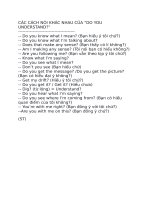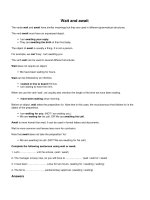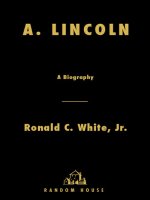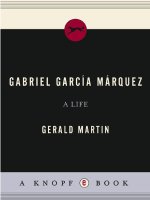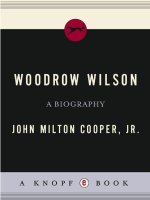Ronald c white jr a lincoln a biography (v5 0)
Bạn đang xem bản rút gọn của tài liệu. Xem và tải ngay bản đầy đủ của tài liệu tại đây (9.6 MB, 636 trang )
ALSO BY
RONALD C. WHITE, JR.
…
The Eloquent President:
A Portrait of Lincoln Through His Words
Lincoln’s Greatest Speech:
The Second Inaugural
Liberty and Justice for All:
Racial Reform and the Social Gospel
An Unsettled Arena:
Religion and the Bill of Rights
(editor with Albright G. Zimmerman)
Partners in Peace and Education
(editor with Eugene J. Fisher)
American Christianity:
A Case Approach
(with Garth Rosell and Louis B. Weeks)
The Social Gospel:
Religion and Reform in Changing America
(with C. Howard Hopkins)
For my wife,
Cynthia Conger White
CONTENTS
…
LIST OF MAPS
CAST OF CHARACTERS
CHAPTER 1
A. Lincoln and the Promise of America
CHAPTER 2
Undistinguished Families
CHAPTER 3
Persistent in Learning
CHAPTER 4
Rendering Myself Worthy of Their Esteem
CHAPTER 5
The Whole People of Sangamon
CHAPTER 6
Without Contemplating Consequences
CHAPTER 7
A Matter of Profound Wonder 1831–42
CHAPTER 8
The Truth Is, I Would Like to Go Very Much 1843–46
CHAPTER 9
My Best Impression of the Truth 1847–49
1809–16
1816–30
1831–34
1834–37
1837–42
CHAPTER 10
As a Peacemaker the Lawyer Has a Superior Opportunity
CHAPTER 11
Let No One Be Deceived
CHAPTER 12
A House Divided
CHAPTER 13
The Eternal Struggle Between These Two Principles
CHAPTER 14
The Taste Is in My Mouth, a Little
CHAPTER 15
Justice and Fairness to All MAY 1860-NOVEMBER 1860
CHAPTER 16
An Humble Instrument in the Hands of the Almighty NOVEMBER 1860-FEBRUARY 1861
CHAPTER 17
We Must Not Be Enemies FEBRUARY 1861-APRIL 1861
CHAPTER 18
A People’s Contest APRIL 1861-JULY 1861
CHAPTER 19
The Bottom Is Out of the Tub JULY 1861-JANUARY 1862
CHAPTER 20
We Are Coming, Father Abraham JANUARY 1862-JULY 1862
CHAPTER 21
We Must Think Anew JULY 1862-DECEMBER 1862
CHAPTER 22
What Will the Country Say? JANUARY 1863–MAY 1863
CHAPTER 23
You Say You Will Not Fight to Free Negroes MAY 1863–SEPTEMBER 1863
CHAPTER 24
A New Birth of Freedom SEPTEMBER 1863–MARCH 1864
CHAPTER 25
The Will of God Prevails MARCH 1864–NOVEMBER 1864
CHAPTER 26
With Malice Toward None, with Charity for All DECEMBER 1864–APRIL 1865
ACKNOWLEDGMENTS
1849–52
1852–56
1856–58
1858
1858–60
NOTES
SELECTED BIBLIOGRAPHY
ILLUSTRATION CREDITS
LIST OF MAPS
…
THE KANSAS-NEBRASKA ACT OF 1854
WASHINGTON, D.C., DURING THE CIVIL WAR
BATTLEFIELDS OF THE CIVIL WAR
CAST OF CHARACTERS
…
EDWARD DICKINSON BAKER (1811-61) A close friend, Baker served with Lincoln in the Illinois legislature. Lincoln
named his second son, Edward, after Baker. Elected U.S. senator from Oregon, he raised the California Regiment
at the outbreak of the Civil War.
EDWARD BATES (1793-1869) Missouri lawyer and conservative Whig politician who took his time in entering the
Republican Party. Vied with Lincoln for the Republican nomination in 1860 and then served as attorney general
during the Civil War.
MONTGOMERY BLAIR (1813-83) Member of a distinguished Democratic family who became a Republican over the
slavery issue. Served as counsel for Dred Scott. Controversial postmaster general in Lincoln’s cabinet.
NOAH BROOKS (1830-1903) Correspondent for the Sacramento Daily Union who became a close friend of both
Abraham and Mary Lincoln. He reported on life inside Lincoln’s White House, and was slated to become Lincoln’s
secretary in his second term.
ORVILLE HICKMAN BROWNING (1806-81) Conservative Illinois Republican who supported Edward Bates at the
Republican convention. After the death of Stephen Douglas in 1861, Browning was appointed to complete his
term. His diary is a source of information on Lincoln.
AMBROSE EVERETT BURNSIDE (1824-1881) A likeable and self-effacing West Pointer, Burnside and Lincoln struggled to
nd the right strategy for the Army of the Potomac’s advance south and the curtailment of the Copperhead
movement in the Midwest.
SIMON CAMERON (1799-1889) As a senator from Pennsylvania, he became a candidate for the Republican
nomination for president in 1860. With some misgivings, Lincoln appointed him secretary of war in his cabinet.
PETER CARTWRIGHT (1785-1872) A Methodist circuit-riding evangelist who, as the Democratic candidate, ran against
Lincoln in the 1846 congressional election.
SALMON P. CHASE (1808-73) Ohio senator and governor, and an anti-slavery leader in politics, Chase became a
candidate for the Republican nomination for president in 1860. Chase served as secretary of the treasury in
Lincoln’s cabinet. He tried to out ank Lincoln for the Republican nomination in 1864. Despite all their
differences, Lincoln appointed Chase chief justice of the United States.
HENRY CLAY (1777– 1852) Lincoln admired Clay, a fellow Kentuckian, who three times ran unsuccessfully for
president. He advocated Clay’s “American System” of strong government support for economic growth. Lincoln
called Clay his “beau ideal of a statesman.”
JAMES C. CONKLING (1816-99) Lincoln’s neighbor and fellow lawyer; when Lincoln decided he could not return to
speak to a Union rally in Springfield in September 1863, he sent Conkling his speech to read at the meeting.
DAVID DAVIS (1815-86) Illinois lawyer and judge and a close friend of Lincoln when they traveled together across
the Eighth Judicial Circuit in the 1850s. He served as Lincoln’s campaign manager at the Republican convention
in Chicago in 1860.
STEPHEN A. DOUGLAS (1813-61) Illinois Democratic rival, sponsored the Kansas-Nebraska Act in 1854 whose
language about the extension of slavery into the territories helped prompt Lincoln’s return to politics. Their
debates in 1858 brought Lincoln national attention even though he lost to Douglas in a contest for the Senate.
Douglas ran against Lincoln in the presidential contest of 1860.
FREDERICK DOUGLASS (1818-95) Editor and abolitionist, Douglass watched Lincoln from a distance starting in 1858,
and then met him twice at the White House during the Civil War. A former slave, Douglass formed a distinctive
relationship with Lincoln, culminating in Douglass’s presence at Lincoln’s second inauguration.
JOHN C. FRÉMONT (1813-90) The
rst Republican candidate for president, he lost to James Buchanan in 1856.
Lincoln appointed him commander of the Department of the West in July 1861, but the president, Frémont, and
Frémont’s wife, Jessie, soon differed over government policy, including slavery.
ULYSSES S. GRANT (1822-85) Having failed in several civilian jobs in the 1850s, Grant rose through the Union army
to become general in chief by the end of the Civil War. As Lincoln went through general after general in the rst
years of the war, Grant gained the president’s admiration, which was returned in kind.
HORACE GREELEY (1811-72) Founding editor of the New York Tribune and powerful opinion maker, Greeley
changed his opinion of Lincoln often. Lincoln’s reply to Greeley’s plea for him to move faster on emancipation
marked the beginning of a series of public letters to present his views to a wider public.
PHINEAS DENSMORE GURLEY (1816-68) Lincoln appreciated the sermons of this learned minister of the New York
Avenue Presbyterian Church in Washington, D.C. Lincoln met Gurley in the years he was rethinking the meaning
of faith and God’s activity in history.
JOHN J. HARDIN (1810-47) A friend, lawyer, and Whig politician from Jacksonville, Illinois, Hardin opposed Lincoln
on internal improvements in the Illinois legislature and defeated him for the Whig nomination for Congress in
1843.
JOHN HAY (1838-1905) Young John Hay, a graduate of Brown, served as one of Lincoln’s secretaries. With a literary
air, he and Lincoln read to each other. Hay’s diary is one of the most insightful guides to the inner history of the
Lincoln administration.
WILLIAM H. HERNDON (1818-91) Lincoln’s surprise choice as law partner in 1844. Herndon, so unlike his senior
partner in temperament and more radical in his political views, actively supported Lincoln’s rise in Illinois
politics.
JOSEPH HOOKER (1814-1879) He earned the nickname “Fighting Joe” for his courage under
re in the Virginia
Peninsula campaign in the spring of 1862. Lincoln appointed him commander of the army of the Potomac in
January 1863, and watched, with both admiration and alarm, Hooker’s military leadership unfold at a critical
time in the war.
NORMAN B. JUDD (1815-78) As an anti-Nebraska Democrat, he voted against Lincoln in the legislative vote for the
Senate in 1855. Judd became a prominent Republican, chaired the state committee, and became a voice for
Lincoln in northern Illinois and at the Republican convention in Chicago in 1860.
GEORGE B. MC CLELLAN (1826-85) Lincoln named McClellan, who received the nickname “Young Napoleon,”
commander of the Army of the Potomac in July 1861, and then general in chief of the Union army. Excellent at
organizing and preparing his men to ght, he nonetheless shrank from ghting, often exaggerating the strength of
enemy forces.
JOHN G. NICOLAY (1832-1901) Lincoln’s loyal secretary, he admired the president in all ways. His notes about life in
the White House would become source material for a biography of Lincoln he would write with John Hay.
WILLIAM H. SEWARD (1801-72) Lincoln’s chief opponent for the Republican nomination for president in 1860;
Lincoln asked him to become secretary of state. Disliked and criticized by many, Seward would become Lincoln’s
best friend in his cabinet.
WILLIAM TECUMSEH SHERMAN (1820-1891) After a struggling start at West Point, in business, and in the rst years of
the Civil War, Sherman rose to become a much-loved and criticized Union general who won victories at Atlanta
and across the South in his controversial march to the sea.
JOSHUA F. SPEED (1814-82) A fellow Kentuckian, Speed became Lincoln’s only truly close friend. They met when
Lincoln moved to Springfield in 1837 and remained friends even when Speed moved back to Kentucky in 1841.
EDWIN M. STANTON (1814-69) A renowned lawyer, Stanton rst met Lincoln in the “Reaper Case” in Cincinnati in
1855. Lincoln invited Stanton, a Democrat, to become his second secretary of war in January 1862.
CHARLES SUMNER (1811-74) Antislavery Republican senator from Massachusetts. Early in the war he believed
Lincoln moved too slowly in his aid for African-Americans. As chairman of the Senate Committee on Foreign
Relations, he proved enormously helpful to Lincoln.
LEONARD SWETT (1825-89) A lawyer who met Lincoln in 1849 on the Eighth Judicial Circuit, he told Lincoln in
1854, “Use me in any way you may think you can.” Swett supported all of Lincoln’s subsequent political
campaigns and traveled to the White House from Illinois because Lincoln so valued his counsel.
LYMAN TRUMBULL (1813-96) A lawyer and Illinois Democrat, he ran against Lincoln for the 1855 Illinois Senate seat.
He supported the founding of the Republican Party in Illinois in 1856 and thereafter became a critical ally of
Lincoln.
ELIHU B. WASHBURNE (1816-1887) An antislavery Republican congress man from northern Illinois, he supported
Lincoln in his 1855 and 1858 Senate races. Washburne became Lincoln’s eyes and ears in Washington during the
long secession winter before his inauguration in March 1861.
GIDEON WELLES (1802-78) As secretary of the navy in Lincoln’s cabinet, he became one of the president’s most
sympathetic supporters. His diary is an invaluable source for understanding the Lincoln presidency.
The best-known sculpture of Abraham Lincoln is in the templed space of the Lincoln Memorial. Daniel
C. French sculpted this working model in 1916. His final rendering of the huge statue was dedicated in
1922.
CHAPTER 1
A. Lincoln and the Promise of America
e signed his name A. Lincoln. A visitor to Abraham Lincoln’s Spring eld,
Illinois, home at Eighth and Jackson would nd “A. Lincoln” in silvered Roman
characters a xed to an octagonal black plate on the front door. All through his life,
people sought to complete the A—to de ne Lincoln, to label or libel him. Immediately
after his death and continuing to the present, Americans have tried to explain the
nation’s most revered president. A. Lincoln continues to fascinate us because he eludes
simple definitions and final judgments.
Tall, raw boned, and with an unruly shock of black hair, his appearance could not
have been more di erent from that of George Washington and the other founding
fathers. Walt Whitman, who saw the president regularly in Washington, D.C., wrote
that Lincoln’s face was “so awful ugly it becomes beautiful.” But when Lincoln spoke,
audiences forgot his appearance as they listened to his inspiring words.
He is one of the few Americans whose life and words bridge time. Illinois senator
Everett Dirksen said fifty years ago, “The first task of every politician is to get right with
Lincoln.” At critical moments in our nation’s history, his eloquent words become
contemporary.
As a young man, he won the nickname “Honest Abe” when his store in New Salem,
Illinois, “winked out.” Rather than cut and run from his debts in the middle of the night,
as was common on the frontier, he stayed and paid back what he called his “National
Debt.” His political opponents invented a long list of denunciations, ranging from “the
Black Republican” to “the original gorilla” to “the dictator.” His supporters crafted
monikers of admiration: “Old Abe,” a ectionately attached to him while he was still a
relatively young man, and the “Rail Splitter,” to remind voters in the 1860 presidential
campaign of his roots in what was then the Western frontier. During the Civil War,
admiration became endearment when the soldiers he led as commander in chief called
him “Father Abraham.” After his controversial decision to sign the Emancipation
Proclamation on New Year’s Day 1863, grateful Americans, black and white, honored
him with the title “the Great Emanci pator.”
Each name became a signpost pointing to the ways Lincoln grew and changed
through critical episodes in his life. Each was an attempt to de ne him, whether by
characterization or caricature.
Yet how did Lincoln de ne himself? He never kept a diary. He wrote three brief
autobiographical statements, one pointedly in the third person. As the Lincolns prepared
to leave for Washington in the winter of 1861, Mary Lincoln, to protect her privacy,
burned her correspondence with her husband in the alley behind their Spring eld home.
In an age when one did not tell all, Lincoln seldom shared his innermost feelings in
public. Lincoln’s law partner, William Herndon, summed it up “He was the most … shutmouthed man that ever existed.” Yet when Lincoln spoke, he o ered some of the most
inspiring words ever uttered on the meaning of America.
Each generation of Americans rightfully demands a new engagement with the past.
Fresh questions are raised out of contemporary experiences. Does he deserve the title
“the Great Emancipator”? Was Lincoln a racist? Did he invent, as some have charged,
the authoritarian, imperial presidency? How did Lincoln reshape the modern role of
commander in chief? How are we to understand Mary Lincoln and their marriage? What
were Lincoln’s religious beliefs? How did he connect religion to politics? As we peel
back each layer of Lincoln’s life, these questions foster only more questions.
Actually, Lincoln did keep a journal, but he never wrote in a single record book. What
I call Lincoln’s “diary” consists of hundreds of notes he composed for himself over his
adult life. He recorded his ideas on scraps of paper, ling them in his top hat or his
bottom desk drawer. He wrote them for his eyes only. These re ections bring into view
a private Lincoln. They reveal a man of intellectual curiosity who was testing a wide
range of ideas, puzzling out problems, constructing philosophical syllogisms, and
sometimes disclosing his personal feelings. In these notes we nd his evolving thoughts
on slavery, his envy at the soaring career of Stephen Douglas, and the intellectual
foundations of his Second Inaugural Address.
Lincoln’s moral integrity is the strong trunk from which all the branches of his life
grew. His integrity has many roots—in the soil, in Shakespeare, and in the Bible.
Ambition was present almost from the beginning, and he had to learn to prune this
branch that it not grow out of proportion in his life. Often, when contemporary
Americans try to trace an inspired idea or a shimmering truth about our national
identity, again and again we nd Lincoln’s initials carved on some tree—AL—for he
was there before us.
Lincoln was always comfortable with ambiguity. In a private musing, he prefaced an
a rmation, “I am almost ready to say this is probably true.” The lawyer in Lincoln
delighted in approaching a question or problem from as many sides as possible, helping
him appreciate the views of others, even when those opinions opposed his own.
In an alternative life, Lincoln might have enjoyed a career as an actor in the
Shakespearean plays he loved. As a lawyer, he became a lead actor on the stages of the
courthouses of the Eighth Judicial Circuit of central Illinois. As president, he was a
skillful director of a diverse cast of characters, civilian and military, many of whom
often tried to upstage him. Although his military experience was limited to a few months
in the Black Hawk War of 1832, Lincoln would become the nation’s rst true
commander in chief, defining and shaping that position into what it is today.
Lincoln is the president who laughs with us. His winsome personality reveals itself in
his self-deprecating humor. As a young lawyer and congressman, his satire could sting
and hurt political foes, but later in life he demonstrated a more gentle sense of humor
that traded on his keen sense of irony and paradox. During the Civil War, some
politicians wondered how Lincoln could still laugh, but he appreciated that humor and
tragedy, as portrayed in Shakespeare’s plays, are always close companions.
Recently, the question has been asked with renewed intensity: What did Lincoln really
believe about slavery? Born in Kentucky, raised in Indiana, and becoming a politician in
Illinois, Lincoln answered this question di erently in his developing engagement with
slavery throughout his life. One of the reasons he hated slavery was that it denied the
American right to rise to African-Americans. In debates with Stephen Douglas and
conversations with African-American leader Frederick Douglass, Lincoln understood that
in doing battle with slavery, he was wrestling with the soul of America.
Lincoln has often been portrayed as not religious, in part because he never joined a
church. How to reconcile this, then, with the deep religious insights of his second
inaugural address, given only weeks before his death? Where are the missing pieces in
his spiritual odyssey? One clue is a private musing on the question of the activity of God
in the Civil War found after his death by his young secretary, John Hay, in a bottom
drawer of his desk. A second is a religious mentor in Washington who played a largely
overlooked role in the story of Lincoln’s evolving religious beliefs.
Lincoln would have relished each new advance in the information revolution. Before
the modern press conference, he became skilled at shaping public opinion by courting
powerful newspaper editors. During the Civil War he learned how to reach a large
audience through the writing of “public letters.” He understood the potential of the
chattering new magnetic telegraph, which allowed him to instantly communicate with
generals in the eld and become a hands-on commander in chief. In the last year and a
half of his life, he surprised members of his cabinet by accepting a clearly secondary role
in the dedication at Gettysburg, only to deliver a mere 272 words that stirred a nation.
Even though we have no audio record of Lincoln’s words, he still speaks to us through
his expressive letters and his eloquent speeches. Lincoln may not have read the ancient
Greek philosopher Aristotle’s Treatise on Rhetoric, but he embodied his de nition that
ethos, or “integrity,” is the key to persuasion. Even when Lincoln disappears in his
speeches—as he does in the Gettysburg Address, never using the word “I”—they reveal
the moral center of the man.
Lincoln was conservative in temperament. As a young man he believed that the role
of his generation was simply to “transmit” the values of the nation’s founders. Over time
he came to believe that each generation must rede ne America in relation to the
problems of its time. By the end of 1862, Lincoln would declare, “The dogmas of the
quiet past are inadequate for the stormy present.” In the last two and a half years of his
life, Lincoln began to think in the future tense: “We must think anew, and act anew.”
However one decides to de ne Lincoln, whatever questions one brings to his story, his
life and ideas are a prism to America’s past as well as to her future.
CHAPTER 2
Undistinguished Families
1809–16
IT IS A GREAT PIECE OF FOLLY TO ATTEMPT TO
MAKE ANYTHING OUT OF MY EARLY LIFE.
ABRAHAM LINCOLN
Autobiography written for John L. Scripps, Chicago Press and Tribune, June 1860
the Republican Party for president.
The selection catapulted the little-known lawyer from Spring eld, Illinois, onto the
center stage of American life. Ordinary citizens were both curious and anxious about this
lanky Westerner with a meager education and limited political experience. He quickly
became courted by journalistic suitors wanting to write his campaign biography. While
candidate Lincoln was busy thinking about the nation’s future, the public was eager to
learn more about his past.
John Locke Scripps, a senior editor of the Chicago Press and Tribune, managed to
convince Lincoln to write an autobiographical account that would serve as the basis for
a campaign biography. This essay of just over three thousand words would prove to be
Lincoln’s longest work of autobiography. His description of his early education is typical
of the essay’s unusual third-person style: “A. now thinks that the agregate of all his
schooling did not amount to one year. He was never in a college or Academy as a
student; and never inside of a college or academy building till since he had a lawlicense. What he has in the way of education, he has picked up.”
Lincoln began his autobiography referring to himself as “A” and progressed to “Mr.
L.” Remarkably brief about certain periods of his life, the essay stops in 1856 and does
not include the 1858 debates with Stephen A. Douglas that rst brought him to national
attention. Lincoln’s spare account tells us as much as he wanted the public to know.
Scripps would recall the di culty he encountered “to induce [Lincoln] to
communicate the homely facts and incidents of his early life.” Plainly uncomfortable
talking about his childhood in Kentucky and Indiana, Lincoln told Scripps, “It is a great
piece of folly to attempt to make anything out of my early life.”
N MAY 1860, ABRAHAM LINCOLN BECAME THE SURPRISE NOMINEE OF
that Lincoln was little interested in his forebears. This viewpoint
misses the paradox of his persistent curiosity about his family history. As he matured,
Lincoln explored his family background, writing to rumored relatives in Massachusetts
and Virginia, but as the 1860 presidential election approached he wished to focus the
AMERICANS HAVE LONG HEARD
portrait of himself as a self-made man. In the nineteenth-century world of public
politics, where it was an advantage to exemplify the heroic ideal of a self-constructed
individual, Lincoln inquired about his family in private. In December 1859, he
responded to a request for autobiographical information from a Bloomington, Illinois,
newspaper editor. Lincoln said tersely, “My parents were both born in Virginia, of
undistinguished families.”
Lincoln became discouraged that he could not trace his lineage back de nitively
beyond his paternal grandfather. Yet the story of Lincoln’s ancestry is much more
complex, and certainly more geographically diverse, than Lincoln could ever have
suspected. He knew almost nothing about the generations of Lincolns that stretched all
the way back to the early seventeenth century when they migrated with some of the first
colonists from England to the New World.
April 8, 1637, young Samuel Lincoln boarded the Rose at the port of
Great Yarmouth in the county of Norfolk, En gland, for the arduous transatlantic
crossing to New England. Two years after the Mayflower had landed at Plymouth,
Samuel was baptized in St. Andrews Church near Norwich on August 24, 1622. At age
fteen he decided to leave behind his village of Hingham in the east of England and
journey to a new life in a New England.
Samuel Lincoln was one of thousands of English men and women who were pushed as
well as pulled from their island home during the politically tumultuous decade of the
1630s. With the ag of England, an upright dark red cross of St. George on a white
background, apping in the breeze, young Samuel became part of “the Great Migration”
of nearly two hundred ships and more than thirteen thousand people who set their
course for the so-called New World between 1630 and 1640.
Derisively called “Puritans” by their opponents, these emigrants had given up hope of
purifying England from the twin tyrannies of state and church. Between 1629 and 1640,
King Charles I attempted to rule absolutely without Parliament. At the same time,
Archbishop William Laud sought to rid the Church of England of its Puritan members
while they sought to further purify it according to the beliefs and practices of the new
Protestant churches of Europe. These dissenters were prepared to cross the ocean so they
could practice their faith freely.
Like many of his fellow immigrants, Samuel Lincoln may have sailed to New England
for both religious and economic reasons. He was coming of age as an apprentice linen
weaver just when an economic depression was hitting East Anglia. He had heard stories
of higher wages in the New World, but he knew that life there could also be harder.
After a journey of more than two months, Samuel Lincoln landed in Salem, in the
Massachusetts Bay Colony, on June 20, 1637. He settled in the new village of Hingham
fteen miles south of Boston. Because of an abundance of weavers, Samuel initially
turned to farming. In time he would pursue business ventures earning him enough
wealth to build a substantial house. He became a member of the Old Ship Church, which
ON A BLUSTERY MORNING,
he helped build and which still stands today. For the Puritans, church membership
provided not only an individual pathway to God but a community that transcended
economic distinctions. Samuel Lincoln, Abraham Lincoln’s rst American ancestor, lived
a long life by the standards of the time, dying in 1690 at the age of sixty-seven.
of American Lincolns carried Samuel’s sense of wanderlust. They
successively traveled farther and farther from their homes in search of new lands and
opportunities on the frontier. The adventures of the Lincoln family’s succeeding
generations offer a portrait of the shaping of the American character.
Samuel’s son, Mordecai Lincoln, moved twice, to Hull and Scituate, both within the
Massachusetts Bay Colony. Mordecai Lincoln, Jr., Samuel’s grandson, ventured nearly
three hundred miles south early in the eighteenth century to the market town of
Freehold, the seat of Monmouth County, in what would become New Jersey. There he
married Hannah Salter, daughter and niece of two New Jersey assemblymen. Mordecai,
Jr., became a successful landowner and businessman. Eventually he moved his family
west along the Burlington Road into southeastern Pennsylvania. He enlarged his land
holdings and became prosperous in the newly developing iron industry. He erected a
forge where the French Creek owed into the Schuylkill River at Phoenixville, about
thirty miles west of Philadelphia. In 1733, he built a spacious steep-roofed brick house
nestled into the side of a hill a few miles east of Reading, Pennsylvania. It still stands
today. Mordecai Lincoln, Jr., the great-great-grandfather of Abraham Lincoln, lived in
three di erent colonies before he died in 1735 at age forty-nine. He left behind a
substantial estate, including more than one thousand acres of land, plus his iron
business.
THE NEXT GENERATIONS
His eldest son, John Lincoln, inherited lands in New Jersey but decided to continue to
reside in Pennsylvania. There he married Rebecca Flower, who came from a prosperous
Quaker family. In 1768, John, who headed the fourth generation of American Lincolns,
traveled along the Great Philadelphia Wagon Road that ran down through Lancaster,
York, and Gettysburg. He continued south, eventually reaching the Virginia Road in the
Shenandoah Valley. “Virginia John” Lincoln settled on Linville Creek, a tributary of the
Shenandoah River, in Rockingham County, near the site of present-day Harrisonburg. At
the time, Virginians called these migrating Pennsylvanians “northern men,” a
designation that meant this part of northern Virginia was becoming a southern
extension of Pennsylvania. John Lincoln settled in a part of the Shenandoah Valley
where Europeans had begun to live only in the 1730s. They developed small farmsteads,
quite di erent from the large tobacco plantations of the older regions of Virginia. Many
of these new immigrants were Quaker farmers who would have nothing to do with
slavery.
, the grandfather of Abraham Lincoln, was born in Pennsylvania in
1744. He would be the last ancestor that Abraham Lincoln could learn much about. In
1770, Abraham married Bathsheba Herring, the daughter of one of the leading families
of Rockingham County. He joined the Virginia Militia, becoming a captain in 1776, just
as the colonies were declaring their independence. Captain Lincoln, as everyone called
him, made a distinguished name for himself in his community.
JOHN’S SON, ABRAHAM LINCOLN
During this time, Daniel Boone was busy exploring the western part of Virginia, a
region called by the Cherokee “Ken-tah-the.” Reports of Kentucky as a new “Eden of the
West” sparked great interest, especially in Pennsylvania, Virginia, and North Carolina.
In March 1775, Boone and his crew of frontiersmen started constructing the “Wilderness
Road” into Kentucky. Nineteenth-century Western artist George Caleb Bingham’s
painting Daniel Boone Escorting a Band of Pioneers into the Western Country depicts a
strapping Daniel Boone marching through the Cumberland Gap, traversing the
Appalachian Mountains just north of where the states of Virginia, Tennessee, and
Kentucky meet. This image helped mythologize the great adventure of opening up the
Kentucky frontier.
The stories of Daniel Boone’s explorations into Kentucky, the “Eden of the West,” may have inspired Lincolns
grandfather, Abraham Lincoln, to take his family through the Cumberland Gap into Kentucky
Grandfather Abraham Lincoln’s decision to continue the family pattern of migration
may have come from Boone’s descriptions of Kentucky. In Virginia, it was common to
respond to queries regarding the whereabouts of a person by replying, “He’s gone to
hell or to Kentucky.” In 1782, while peace talks to end the Revolutionary War started in
Paris, Abraham and Bathsheba Lincoln and their family left the Shenandoah Valley on a
two-hundred-mile journey through di cult terrain to Kentucky. Traversing the
Wilderness Road, the Lincolns carried their household goods and farm tools, as well as
their Bible and a flintlock rifle.
If wanderlust was romantic, it could also be perilous. After the French and Indian War
ended in 1763, Native Americans were surprised when American settlers pushed into
their territories. Even after the Continental Congress established the Ohio River as a
dividing line between American Indians and the settlers, colonists continued to attack
tribes north of the Ohio in their relentless search for more land. The Indians retaliated
with raids into Kentucky. Living at the edge of the constantly moving frontier, the
settlers learned to build their homes in or near fortified stockades.
Captain Abraham Lincoln built his family a log cabin on land near Hughes Station,
probably just east of what is today Louisville. On a May afternoon in 1786, while
Captain Abraham Lincoln and his three sons were out planting corn, a Native American,
probably a Shawnee, shot Abraham from the nearby woods. Terri ed, his sons
Mordecai, fourteen, and John, twelve, ran for the safety of the stockade, leaving their
brother Thomas, age six, sobbing beside his dying father. The warrior dashed from the
woods, descending upon the younger brother who could be killed or taken away. Young
Mordecai turned, steadied his intlock ri e, and red at the silver crescent suspended
from the neck of the Shawnee warrior, killing his father’s assailant.
Abraham Lincoln, the future president’s grandfather, was buried in deerskins near
Hughes Station. Although only forty-two, he had followed the wealth-building pattern of
his father and grandfather in Pennsylvania and Virginia, amassing more than ve
thousand acres of Kentucky land. Sixty-eight years later, at age forty- ve, his grandson,
Abraham, would recall to a newly discovered relative the story of his grandfather’s
death, this “legend more strongly than all others imprinted upon my mind and
memory.”
, the death of a father turned everything upside down. Abraham left his
wife, Bathsheba, and their ve children ample property, but his sons were too young to
carry on the necessary clearing and cultivation of the land.
Thomas Lincoln, the future president’s father, was only six years old when his father
died before his eyes. His life without a father and with his oldest brother, Mordecai,
managing their father’s estate, would now be lived out in di erent conditions from his
forebears.
IN A FRONTIER SOCIETY
Abraham Lincoln would say of his father’s youth, “Even in childhood [he] was a
wandering, laboring boy.” This brief comment might suggest that Thomas Lincoln from
a very young age had no home or support. In truth, relatives of Bathsheba Lincoln
reached out to help after her husband’s death. Hannaniah Lincoln, a cousin who had
served as a captain in the Revolutionary War, welcomed Bathsheba and her ve
children into his home forty miles to the south near Springfield, Kentucky.
Within a few years of his father’s death, young Thomas Lincoln was sent out to work.
He labored on neighboring farms, earned three shillings a day at a mill, and worked one
year for his uncle Isaac on his farm in the Watauga River Valley in Tennessee.
Returning to Kentucky, Thomas apprenticed as a carpenter and cabinetmaker in a shop
in Elizabethtown.
The lens of history has often ltered Thomas Lincoln in dark and disapproving colors,
detractors framing him as lacking in initiative and economic accomplishment. Part of
this portrait comes from a son who would say his father “grew up literally without
education,” the very value Abraham Lincoln would come to prize the most.
The lter should be removed in order to color in a more accurate picture.
Reminiscences about Abraham Lincoln’s father o er an ambiguous report on what kind
of man he truly was. Thomas Lincoln was a sturdy man, about ve feet ten inches tall,
with dark hazel eyes, black hair, and high cheekbones. Although he lacked formal
education, this was not unusual on the early American frontier. He served in the local
militia, on juries, and became an active member of the Baptist church. Dennis Hanks, a
cousin of Abraham Lincoln’s mother, said of Thomas, “He was a man who took the
world Easy—did not possess much Envy,” observing that Thomas “never thought that
gold was God.” One neighbor remembered him as a “plain unpretending plodding man.”
Another called him a “good quiet citizen,” and a third said he told stories with a wry
sense of humor, a trait his son would inherit.
One neighbor recalled that Thomas “accumulated considerable property which he
always managed to make way with about as fast as he made it.” Like the Lincolns
before him, Thomas Lincoln had a hunger for land. At the age of twenty- ve, in 1803,
he purchased a 238-acre farm on Mill Creek, a tributary of the Salt River, for 118
pounds in cash. At about the same time, he bought two lots in Elizabethtown. Thomas
Lincoln’s accumulation of property was such that within a decade he would rank
fteenth of ninety-eight property owners listed in Hardin County in 1814. For a long
time in American presidential history, the demeaning of Thomas Lincoln became a
means to set up a contrast with the accomplishments of his supposedly self-made son.
The truth, as always, is much more complex.
ON JUNE 12, 1806
, Thomas Lincoln married Nancy Hanks. How and when Thomas and Nancy
first met and courted has unfortunately disappeared into the mists of time.
Nancy Hanks’s ancestry is also shrouded in mystery. Her forebears may well have
traveled the same route as John Lincoln and his family from Pennsylvania to Virginia,
also settling in Rockingham County around 1770. Nancy was born in Virginia, probably
in 1784, and as a young child traveled to Kentucky in the late 1780s.
Her father, Joseph Hanks, died when Nancy was a young girl, and her mother, Nancy
Shipley, died soon thereafter. The family of eight children scattered among various
relatives. Her aunt, Lucy Shipley Berry, took Nancy into their family on their farm near
Springfield, Kentucky.
Although we don’t know when, Thomas Lincoln and Nancy Hanks probably met at the
Berrys’ two-story log home. Their marriage, presided over by Jesse Head, a well-known
Methodist minister, took place at sunset on an early summer evening. Weddings were
grand social occasions for people who lived great distances from one another on the
frontier. Friends of Thomas and Nancy enjoyed the wedding feast, a barbecue,
accompanied by the singing of the good old tunes “The Girl I Left Behind” and “Turkey
in the Straw.” On their wedding night, Thomas was twenty-eight and Nancy was
twenty-two.
Thomas Lincoln lived nearly his whole life as a farmer in Kentucky and Indiana. His relationship with his son
has been the subject of much speculation.
The young couple moved to Elizabethtown shortly after their wedding. Etown, as it
was called, was a raw frontier settlement made up of mainly log cabins. It boasted a
few frame houses, a new courthouse made with brick from the local brickyard, and a
debating society. Thomas built a log cabin on one of the two lots he owned.
Thomas and Nancy’s rst child, Sarah, was born on February 10, 1807. The biblical
name for their daughter had appeared often in the previous generations of Lincolns.
Sarah had dark hair and gray eyes. As she grew, many neighbors remarked that she
resembled her father.
In December 1808, Thomas sold his rst farm and purchased a second farm on the Big
South Fork of Nolin Creek, twelve miles southeast of Elizabethtown. The Sinking Spring
farm took its name from its freshwater spring at the foot of a deep cave. Thomas built a
one-room rude cabin on a knoll above the farm’s spring. The sixteen-by-eighteen-foot
cabin’s simple construction consisted of logs lined with clay. It had a dirt oor and a
stone replace, standard for the day. The cabin may have had a window, without glass,
covered by greased paper. Nancy gave birth to her second child, Abraham, in this new
log cabin on February 12, 1809. He was named for his assassinated grandfather.
birth, Kentucky embodied all that was new in a region people called
“the West.” Like Abraham’s parents, most settlers had come from someplace else. Life
was di cult on the frontier, but letters to relatives on the Atlantic seaboard told stories
of people choosing pioneering life, hard though it might be, over the more settled lives
they left behind.
George Washington, the nation’s rst president, died in 1799, ten years before
Lincoln’s birth. Such was Washington’s stature that the new nation was still mourning
his passing, observing in elaborate ceremonies the dates of his birth and death. Within a
month of Lincoln’s birth, Thomas Je erson, author of the Declaration of Independence,
would complete his second term as the third president of the United States. When
Je erson articulated his vision of an America of small farmers, he was thinking of
people like the Lincolns.
In later years, Lincoln would say that he could remember nothing of his birthplace
and the log cabin at the Sinking Spring farm. As a toddler, he may have wandered the
hillsides or explored the cave by the spring. There is little reason to think it was an
unhappy place to be born.
In 1811, when Abraham was two, Thomas and Nancy Lincoln moved again, their third
move in ve years. Drawn by more fertile land, they relocated six miles north to a farm
in the Knob Creek Valley. Thomas could now work the long tongues of level land made
rich by Knob Creek. Heavily wooded steep limestone blu s, marked by deep gullies and
small knob-like hills, from which the valley and creek derived their names, bounded the
farm. The creek, piercing its way through the limestone rock, was adorned with
sycamore and elms, their branches hanging in a protective pattern over the waters.
Thomas Lincoln’s chief crop was corn, but he also planted beans. Abraham, like his
father and grandfather before him, grew up a farmer’s son.
AT THE TIME OF LINCOLN’S
Young Abraham lived near the old Cumberland Trail, the road for travelers on their
way from Nashville to Louisville. On many days the boy could watch and wonder at all
kinds of people passing by: soldiers on their way home from the War of 1812,
evangelists taking part in the religious revival called the Second Great Awakening,
peddlers selling goods procured from a larger world, promoters of land schemes, and—
every once in a while—a coffle of slaves plodding behind a slave trader.
came of age amid a growing controversy over slavery in Kentucky. David
Rice, a Presbyterian minister, had delivered an address before the Kentucky
Constitutional Convention of 1792 calling “Slavery Inconsistent with Justice and Good
Policy.” Rice argued that slavery was “a standing monument of the tyranny and
inconsistency of human governments.” He declared slavery to be not only bad for
blacks, but corrosive of the values of whites as well.
Both Thomas and Nancy Lincoln experienced slavery everywhere they lived. The
Berrys, with whom Nancy lived before her marriage, owned ve slaves. When Thomas
worked for a year in Tennessee, he came to know his uncle Isaac’s six slaves. In 1811,
two years after Abraham Lincoln was born, the tax list for Hardin County listed 1,007
slaves for taxation, whereas the white male population over the age of sixteen was
1,627.
The churches in Kentucky became central players in the debate over slavery. The
Baptists, Methodists, and Presbyterians—the largest Pro testant churches in the early
settlement in Kentucky—were torn and sometimes divided by the controversy. Jesse
Head, the Methodist minister who married Thomas and Nancy, had a reputation for
speaking boldly against slavery; it is likely they heard him preach on the subject.
Thomas and Nancy Lincoln attended the South Fork Baptist Church, a Separate Baptist
congregation two miles from their Sinking Spring farm. At the time, Baptists in
Kentucky were divided into three main varieties. General Baptists emphasized free will,
believing that salvation was open to anyone who desired it. Particular Baptists were
more exclusive, believing in a strict Calvinism emphasizing God’s providential initiative
in salvation rather than human free will. Separate Baptists, by far the largest group of
the Kentucky Baptists, were more experiential and thus emotional in their worship.
In the year before Abraham Lincoln’s birth, the South Fork Baptist Church burst apart
in a debate over slavery. In December 1807, the minister, William Whitman, had
declared himself to be an “amansapater” (emancipator). In August 1808, fteen
members “went out of the church on account of slavery. ”
Thomas and Nancy Lincoln decided to join those helping to found the new Little
Mount Baptist Church located three miles northeast of the Sinking Spring farm. William
Downs, the organizing pastor, was recognized as one of the “brilliant and fascinating
orators” among the Kentucky Baptists. The Lincolns, sitting through Downs’s emotional
antislavery sermons, surely brought this into family conversations with young Abraham
and Sarah.
ABRAHAM LINCOLN
